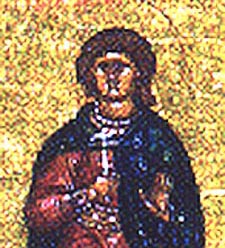|
|||
|---|---|---|---|
| This weekly bulletin insert complements the curriculum published by the Department of Christian Education of the Orthodox Church in America. This and many other Christian Education resources are available at http://dce.oca.org. | |||

Saint Julian of Tarsus in Cilicia was born to a pagan father who was a member of the nobility, and a Christian mother. He lived in the late third century. Like other Christians married to pagan men, Julian's mother secretly taught him the faith. He grew into a thoughtful, well-spoken young man and a dedicated Christian. When Julian was in his late teens, the local magistrate Marcian, on the orders of the emperor Diocletian, began rounding up Christians for interrogation, threatening those who would not worship the pagan gods. Because Julian was adamant in his refusal, and because he was attractive and young, Marcian decided to parade him from city to city, subjecting him to humiliation and beatings along the way. This display was meant to show people that the government could do whatever it liked with people who so obstinately disrespected the gods, no matter how well-born or appealing they might be. But Julian, becoming weaker and more wounded every day from the terrible treatment he endured, still refused to renounce Christ. His mother encouraged him by following at a distance, praying that he would stay strong in his faith. When he was finally thrown into a dungeon in a coastal city, she begged the magistrate to let her visit him for a few days. Thinking she intended to convince her son to save his life by worshipping the gods, the magistrate agreed. But Julian's mother spent the time praying with her beloved boy, urging him not to give in no matter what was done to him. She contrasted the darkness of the dungeon with the light of the Kingdom, the light that banishes all darkness. She reminded him that the heavenly light awaited him if he would remain strong. When the mother and son were brought before the magistrate, they both denounced the vain superstitions of the gods, and declared their devotion to Jesus Christ. The magistrate, feeling he had been tricked, ordered their immediate execution. Over Saint Julian's relics, which were eventually taken to Antioch, Saint John Chrysostom eulogized him, and in Saint John's words we hear about the light that illumines and the light that burns. He said, "A holy voice comes forth from the lips of the martyr, and with this voice is poured out a light brighter than the rays of the sun." He also said, "Take whomsoever you will, be he a madman or one possessed, and lead him to the grave of this saint, to the martyr's relics, and you will see the demon immediately jump out and flee as from a blazing fire."
As Saint John says, to anyone who is willing to hear Saint Julian's "holy voice" there is also that "light brighter than the sun" that comes forth from him. But to a demon, the light is unbearable; it's like a "blazing fire" and the demon must immediately "jump out." What will the light of Jesus Christ be to us: illumination, or unbearable burning? The light is given, and its effect is up to us. |
|||
